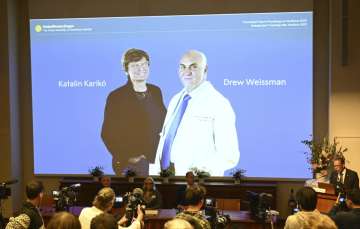The Nobel Prize 2023 has been awarded to scientists Katalin Karikó and Drew Weissman for their revolutionary work in the development of mRNA vaccines against COVID-19.
Karikó and Weissman won the much-coveted prize for their discoveries regarding nucleoside base modifications that helped the development of effective mRNA vaccines against COVID-19.
The COVID-19 pandemic, that began in early 2020 in China, devastated the global economy and led to millions of deaths all across the world. The virus posed one of the greatest threats to human health in the modern era.
Karikó and Weissman's work was crucial to combat the deadly pandemic and their groundbreaking findings fundamentally changed the understanding of how mRNA interacts with the human immune system, noted the Nobel Committee. They contributed immensely to the vaccine development against COVID-19.
The scientists worked together at the University of Pennsylvania. Karikó is a professor at Sagan’s University in Hungary and an adjunct professor at the University of Pennsylvania. Gunilla Karlsson Hedestam, who is part of the panel that chose the winners, said that their work was very important "in terms of saving lives, especially in the early phase of the pandemic."
The prizes come with a cash reward of 11 million Swedish kronor ($1 million). The money comes from a bequest by the prize’s creator, Swedish inventor Alfred Nobel, who died in 1896. Karikó and Weissman have been invited to receive their awards at a ceremony on December 10, which marks the anniversary of Nobel's death.
The peace prize is handed out in Oslo, as per Nobel's wishes, while the other award ceremony is held in Stockholm. The Nobel Prize for physics will be announced on Tuesday, chemistry on Wednesday and literature on Thursday. The winner of the Nobel Peace Prize will be announced on Friday.
Last year, the Nobel Prize in physiology or medicine was won by Swedish scientist Svante Paabo who made discoveries in human evolution to unlock secrets of Neanderthal DNA that provided key insights into the immune system, including our vulnerability to COVID-19.
(with agency input)
ALSO READ | International Nelson Mandela Day 2023: Twelve lesser known facts about South Africa's first black president
Latest World News
